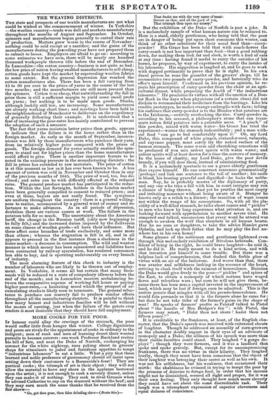THE WEAVING DISTRICTS.
THE state and prospects of our textile manufactures are not what could be wished at the commencement of winter. In Yorkshire —the woollen country—trade was dull and markets unsatisfactory throughout the months of August and September. In October, spinners and manufacturers began generally to curtail their rate of production. Matters grew worse in the course of November : nothing could be sold except at a sacrifice; and the gains of the manufacturers during the preceding year have not prepared them to submit to losses. Employers are afraid to go on : according to some estimates we have seen, there will be nearly one hundred thousand workpeople thrown idle before the end of December. In Lancashire—the cotton country—business is not quite so bad: the low price of cotton having enabled manufacturers to sell cheap, cotton goods have kept the market by superseding woollen fabrics to some extent. But the general depression has reached the cotton manufactures also. There has been a fall varying from 15 to 20 per cent in the prices of yarns in the course of the last two months ; and the manufacturers are still more pressed than the spinners. Cotton is so cheap, that notwithstanding the fall in price there is still a sufficient margin to yield some small profit on yams • but nothing is to be made upon goods. Stocks, although luckily still low, are increasing. Some manufacturers are already working short time ; and meetings have been held in the neighbourhood of Manchester to deliberate on the expediency of generally following their example. It is understood that a fear of increasing the poor-rates has mainly contributed to prevent the adoption of such a measure.
The fact that yarns maintain better prices than goods, appears to indicate that the failure is in the home rather than in the foreign market. As early as the month of September, inconve- nience was felt by those manufacturers who purchase their yarn, from its relatively higher price compared with the prices of goods. The foreign demand for yarns actually enabled the spin- ners to stand out for higher prices than the home manufacturers could afford to give. There is another important feature to be noted in the existing pressure in the manufacturing districts : the fall in prices has extended to raw materials. The price of cotton is at this moment as low as it has ever been known to be. A less amount of cotton was sold in November and October than in any of the previous months of 1845. The price of wool, too, has de- clined; and sales can be with difficulty effected at the reduced rates. The general produce market has participated in the reduc- tion. Within the last fortnight, holders in the London market have been generally compelled to consent to reduced prices ; and even at these buyers are not easily found. The symptoms are uniform throughout the country : there is a general willing- ness to realize, accompanied by a general want of money and re- luctance to make advances. As in all periods of depression, doubtless there are various causes at work. The failure in the potatoes tells for so much. The uncertainty about the American tariff, the change in the Russian tariff, (only now beginning to be fully felt,) and the increased duties imposed by the Zollverein on some classes of woollen goods—all have their influence. But these affect some branches of trade exclusively, and some more than others ; whereas the stagnation is felt in all, and in all appears to proceed in the that instance from a slackness in the home market—a decrease in consumption. The wild and wanton manner in which money has been squandered and liabilities have been contracted by railway speculation, has rendered consumers less able to buy, and is operating unfavourably on every branch of industry. The most alarming feature of this check to industry is the number of labourers who are likely to be thrown out of employ- ment. In Yorkshire, it seems all but certain that many thou- sands will be reduced to a state of compulsory idleness before the end of the month ; and in Lancashire masters arebalancing be- tween the comparative expense of working full hours or paying higher poor-rates' —a hesitating mood which the prospect of ac- cumulating stocks is likely soon to terminate. The general reluc- tance to purchase can scarcely fail to produce similar effects throughout all the manufacturing districts. It is painful to think how many honest and industrious families will be left without the means of earning, just when the failure of the potato crop renders it most desirable that they should have full employment.


























 Previous page
Previous page